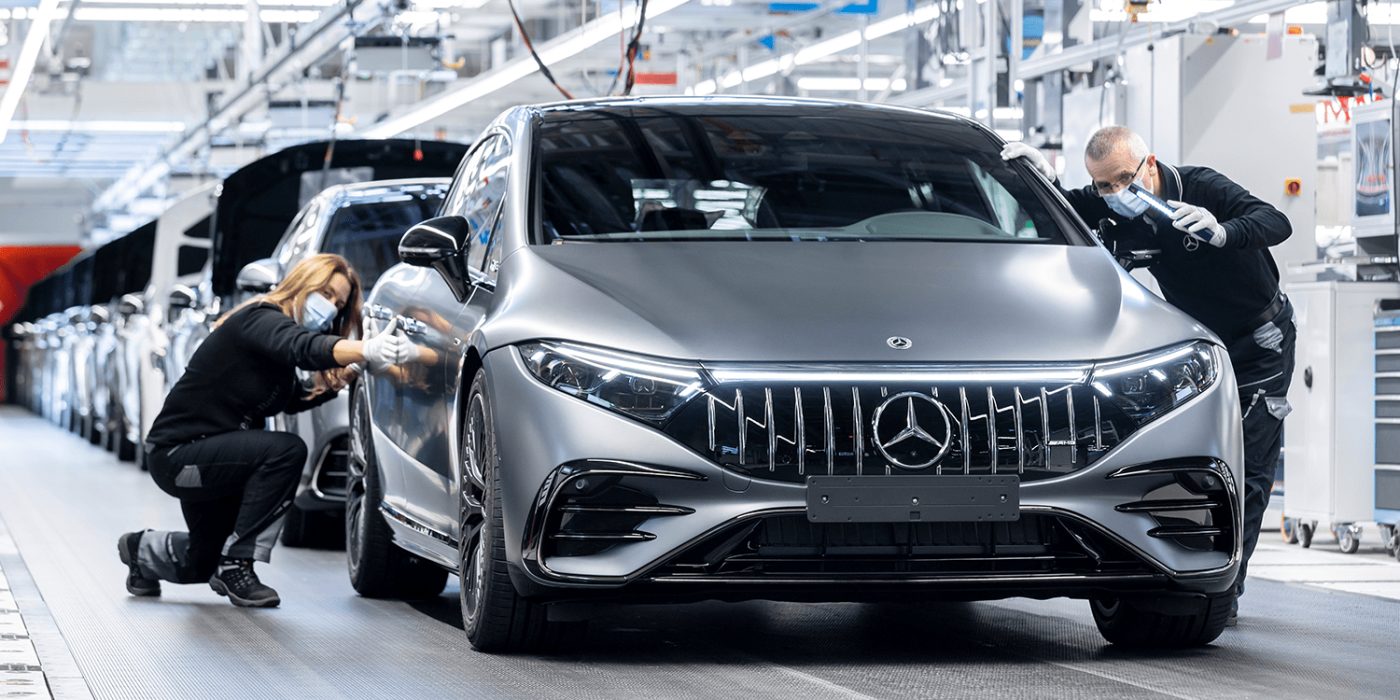Mercedes doubled EV sales over 2022
Mercedes-Benz Passenger Cars delivered 117,800 battery-electric cars in 2022. Thanks to a strong final quarter, the Stuttgart-based company was able to more than double its electric car deliveries compared to the previous year.
The 117,800 electric vehicle deliveries are accounted for only by the Mercedes-Benz brand (including vans), which was still at 52,500 electric cars in the previous year. This corresponds to a sales growth of 124 per cent. This was made possible by 42,400 deliveries of battery-electric cars in the fourth quarter alone – the previous best figure for Mercedes was 30,000 new electric cars in Q3.
Across all drive types, Mercedes-Benz Passenger Cars delivered 2,043,900 vehicles to its customers, which is one per cent less than in 2021. Compared to the BMW Group’s 2.4 million deliveries, Mercedes is behind the Munich-based company.
This also applies to electrified vehicles: Mercedes could deliver 319,200 xEVs worldwide in 2022 (Mercedes includes BEV and PHEV together in the xEV descriptor) – compared to 372,956 electrified BMWs. For Mercedes, this represents a 19 per cent increase over 2022 and 15 per cent of total sales in 2022. The 319,200 xEVs include Smart as well as the Mercedes-Benz brand. At the brand, which is now based in China, 44 per cent of all deliveries were battery-electric – both the last examples of the Smart-EQ Fortwo and the first vehicles of the Smart #1 built in China.
One of the few comparisons that can be made on the basis of the figures published so far is that of 117,800 battery-electric Mercedes vehicles with 172,001 battery-electric BMWs. To be fair, if we subtract Mercedes’ van deliveries (see below) and only take the passenger car models, Mercedes is left with 103,100 units – and the comparison is even more clearly in favour of BMW.
At the company level, however, the BEV registrations (215,775 electric cars at the BMW Group) cannot be compared, as Mercedes does not explicitly report BEV sales of Smart. As mentioned above, BMW is also ahead in terms of xEV deliveries at the company level with 372,956 to 319,200 deliveries. Due to the lack of data on Smart, it is currently not possible to break down these statistics more precisely into BEVs and PHEVs.
Unlike BMW, Mercedes also gives some figures on the models: 19,200 vehicles of the luxury sedan EQS were handed over to customers in 2022, “driven by strong demand in the US”. In Q4, the EQS had its best sales quarter to date, Mercedes says – but exact figures are not given. One class below what Mercedes calls the ‘Top-End Luxury’ segment, the EQE came in at 12,600 deliveries in the ‘Core Luxury’ group – although 2022 was not yet a full sales year for the EQE.
The electric bestsellers of the Mercedes-Benz brand were the EQA and EQB model series in the “Entry Luxury” segment. Of the two E-SUVs, 33,100 units (+43 per cent) were delivered in the case of the EQA and 24,200 EQB. With 57,300 compact e-models, ten percent of all Mercedes sales in the “Entry Luxury” class were battery-electric.
Mercedes-Benz Vans sold 14,700 pure electric vehicles last year, 15 per cent more than in 2021. The van division does not break down deliveries to the eSprinter, EQV and eVito model series in detail. What is clear is that the smallest electric model series eCitan and EQT will not be delivered until the first quarter of 2023 and are therefore not yet included in the annual statistics for 2022.
If we subtract the four models mentioned above and the electric van deliveries also included from the 117,800 BEV deliveries, 14,000 unspecified units remain. This must be the Stuttgart company’s remaining electric model, the EQC. According to rumours, however, this model should soon make way for an electric sedan the size of the C-Class with this model designation to follow in 2024 – including an SUV offshoot.
“2022 marks another successful year in the transformation of Mercedes-Benz: We more than doubled our BEV sales, we demonstrated our high ambition in electric with the 1,200 km EQXX test drive and we achieved a new record year for Mercedes-Maybach with sales up 37%,” says Mercedes CEO Ola Källenius. “In 2023 we will continue our mission to offer the most desirable electric cars and further grow our BEV and Top-End sales.”
This year, the already unveiled SUV offshoots of the EQS and EQE will also be delivered and included in the statistics.
mercedes-benz.com (cars), mercedes-benz.com (vans)




